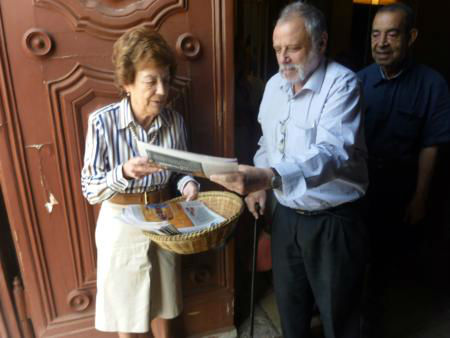Portuguese face economic crisis with pragmatism, hope
LISBON, Portugal (CNS) -- A restaurant maitre d' in Almada tells patrons about his recent return home after a long hospitality career in Belgium. A business conference planner in Luxembourg returns to the Lisbon coastal communities for birthday and family celebrations.
And in Lisbon's historic Alfama district, after singing in a one-hour choral concert before the Sunday evening Mass at the Cathedral of St. Mary Major, Dina Antunes wonders about her career prospects in the sciences.
Antunes, who was born in Lisbon, said she just finished a master's degree in chemical engineering at the University of Lisbon.
"I will find work this year I hope," Antunes said, noting that she completed an internship in Germany at the Max Planck Institutes and is open to the idea of working long-term in Germany.
"In my field and other fields of science most students have to go abroad to finish their studies," said Antunes.
Portugal, recipient of a massive set of loan bailouts over the last four or five years, is considered among the poorest of the major West European nations. Amid a Eurozone economic downturn, deep national austerity measures, high youth unemployment rates and now a widely monitored banking crisis at Portugal's Banco Espirito Santo, the Portuguese have protested their hardships a little less publicly and less robustly than their neighbors in Spain, but they are facing housing and health care cost increases.
Whereas going abroad seeking work is not necessarily anything new for the Portuguese, who have responded to economic hard times in a variety of ways during the last century, government and even church officials in Portugal and Spain have expressed some alarm at the high rates of talented young and professional workers who have been leaving for employment outside the region.
At the same time, waves of both legal and undocumented foreign workers from South America and Africa, along with retirees, have been coming to Portugal to live or find low-wage employment positions that the Portuguese leave vacant. Summer, with its season of "festas" and family-oriented get-togethers, often brings expat Portuguese workers home to their villages of origin.
At Lisbon's Sao Sebastiao da Pedreira parish in the city's midtown area, Maria Pinto Basto, a senior citizen who sold copies of the archdiocesan newspaper Voz da Verdade, spoke to Catholic News Service about her four children. Two of them have worked abroad for years; her two other children stayed in Portugal.
"I have a daughter who is a lawyer without a job, but I have to be patient. She likes the idea of working in the hotel business," Basto said, noting that the region's high unemployment is hard on everyone and that "we have a problem, but we must have calm."
David Rocha, 21, an altar server Sao Sebastiao da Pedreira, recently earned a bachelor's degree in economics and started his master's degree in management. He told CNS that Iberians should embrace workplace change.
"It's the price we pay for a globalized economy, and of course some people leave Portugal because they are facing difficulties, but globalization is the idea behind all the migration -- it has happened before with other generations," Rocha said.
"I don't perceive emigration as a big deal, because when the markets start to open and if things are well-regulated, it doesn't matter anymore where you go: There are people going out and people coming in," he said, noting that globalization is still a new concept for many countries, but that national mentalities are changing fast.
"We can make great things happen as we have for the last centuries for Portugal, and I don't think it is a matter of right and wrong but a matter of the future -- the thing we really lack right now is optimism, and if we gather a bit of that we can go very far," he said.
At the Lisbon cathedral, choir member Sophia Fernandes said she is retooling her career with studies in neuroscience, but currently working only part time as a physical therapist -- an area with few full-time jobs available.
"Although historically the Portuguese have gone to work in France, Luxembourg or England, nowadays there is unemployment in those places, too, and so they are going now to northern Europe ... along with Arabia, Dubai, Malaysia and to Africa," she said.
"I think the situation will improve -- not this year but maybe in the next couple of years," Fernandes said, adding that meanwhile, "we have had people coming from Brazil, India and Africa, so the empty spaces are filled with new people coming looking for new spaces."
Joao Povoa, a young adult cathedral parishioner who owns an information technology business and who employs several others, said he is one of the lucky Portuguese who has a needed service; he sells accounting and payroll software. He said he worries his clients' economic pain will affect their ability to keep commitments with him.
Povoa said some of his colleagues have chosen to work in high-tech and industry sectors in the former Portuguese colonies in Africa, including Angola.
"Angola needs technology and there is a lot of money to be made because the big export companies have resources to spare -- they bring people for three or four months at a time -- so Africa is one of the best ways to make a living if you can get there with some key skills and key contacts," Povoa said.
He said Portugal's economy has been helped by a steady flow of Europeans retiring in Portugal because of tax breaks and good climate.
"We will probably see more of that in the coming years," he said "They love the weather, our food."



















